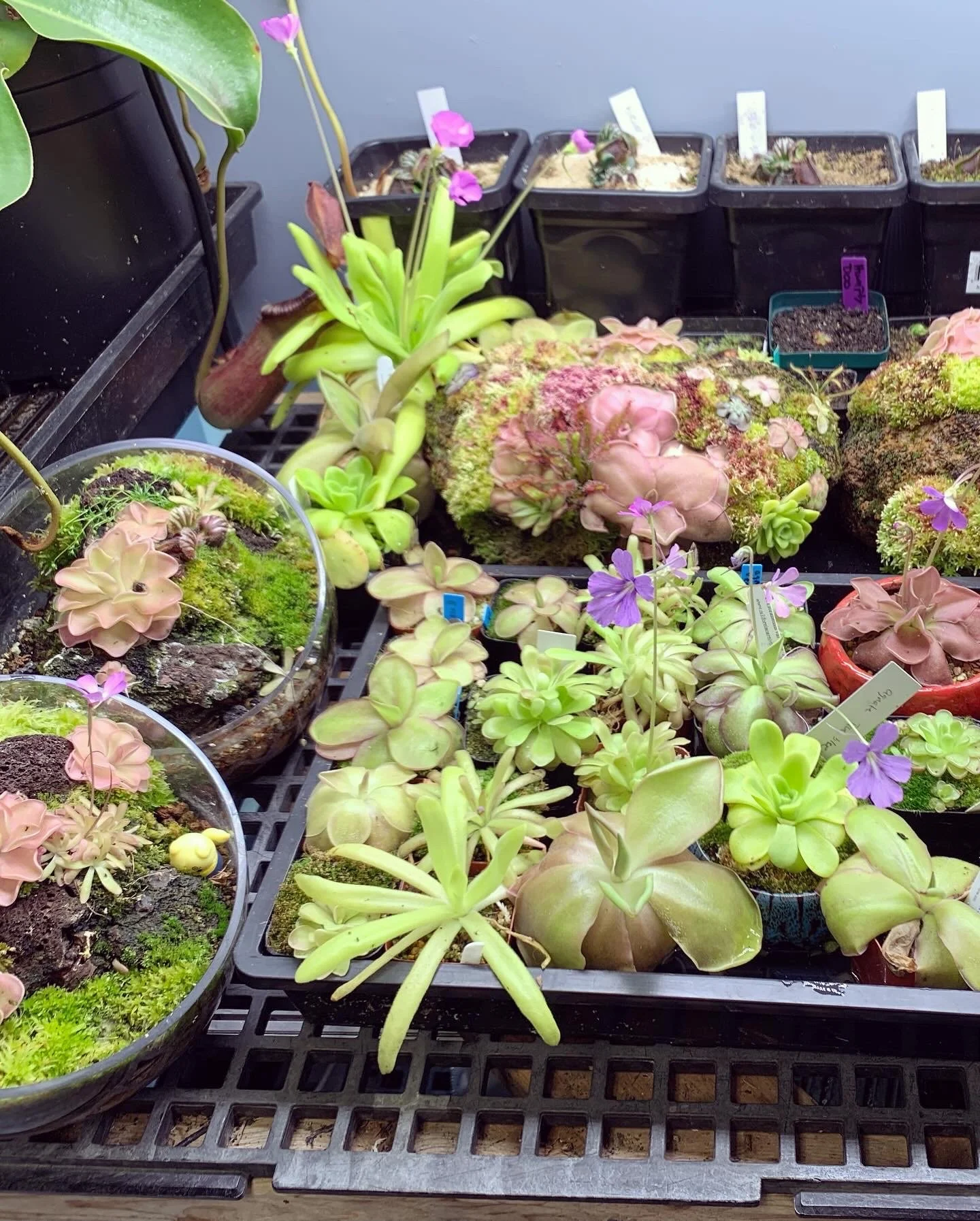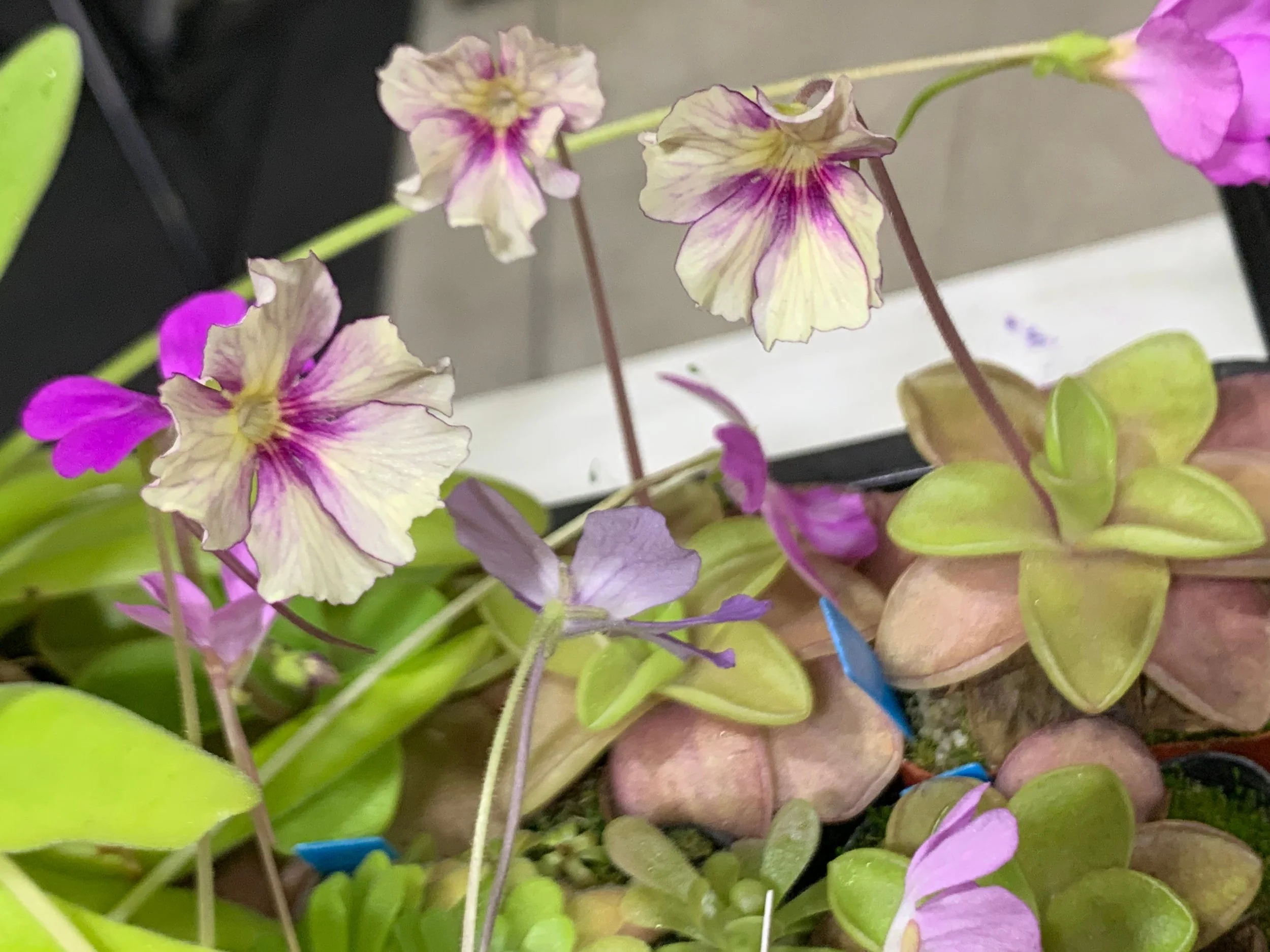Creating a
Pingdom
Create a living work of art that actually works for you. In this hands-on workshop, you'll design and build your own carnivorous plant display featuring Mexican Pinguicula (butterworts)—stunning plants that happen to be exceptional at catching fungus gnats and fruit flies. Choose from a curated selection of volcanic rock, planting media, and plants to craft an arrangement that's uniquely yours. We'll cover everything you need to know about care and maintenance, so your display thrives long after you take it home.
What you’ll get
-
✺
Expert instruction with hands-on support throughout the build process
-
✺
Pumice base rock for proper drainage architecture
-
✺
Substrate choice: organic or inorganic mix formulated for Pinguicula
-
✺
Three Mexican butterworts from our collection
-
✺
Live sphagnum moss for finishing and moisture management
-
✺
All the knowledge needed to maintain your display long-term
Workshop Details
Location: Plantella Expo in Springfield, Mass.
Date: October 19, 2025
Time: TBD by event coordinator
Cost: $55
Description
The world of carnivorous plants is both fascinating and vast. Join CleverCarnivores as their experts walk you through the care and maintenance required to start or prolong your carnivorous plant hobby. Often a great compliment to other houseplants, we have selected Mexican pinguicula, commonly known as tropical butterworts, to introduce first timers to the slight nuances that many carnivorous plants share. Our workshop will include everything needed, from various substrates to the plants and care instructions, to ensure a thriving display. Participants will explore the differences in media and how each can be used to form unique and functional habitats for their developing collection.
Once the basic care is explained, participants can combine their functional knowledge of what the plants need with their own personal ascetic. There is enormous variety in the leaf shape, color, size, and form of the 80 or so recognized species of Mexican pinguicula, which share similar care and requirements. Including hybridization, there is an astronomical amount of possibilities for how one can express their horticultural art. As the project grows and develops, the artist will be rewarded for their vision with expanding and multiplying plants that each mature with beautiful and delicate flowers of various colors and sizes.
This workshop is featured at Plantella
What it is: A houseplant expo featuring vendors, artisans, and plant-themed products.
Where: MassMutual Center in Springfield, MA.
When: Sunday, October 19th, 2025.
What to expect:
Vendors: Selling tropical plants, Hoyas, cacti, succulents, orchids, and more.
Artisans: Offering plant-inspired art, fashion, and accessories.
Workshops: Hands-on opportunities to learn new skills, such as macramé plant hanger creation.
Community: A chance to connect with other plant lovers.
How to get tickets:
Visit PLANTELLAEXPO.COM/springfield to purchase tickets and find more event information.
✺ Frequently asked questions ✺
-
Not at all. This workshop is designed to welcome both first-time growers and experienced collectors. We'll cover the fundamentals of carnivorous plant care with a focus on what makes Mexican Pinguicula an ideal starting point—they're more forgiving than many carnivores while still offering the fascinating traits that make these plants so captivating.
-
Everything you need to create and maintain your display: premium pumice base rock, your choice of substrate (organic or inorganic mix), three Mexican Pinguicula specimens, live sphagnum moss, comprehensive care instruction, and hands-on guidance throughout assembly. You'll leave with a completed arrangement and the knowledge to keep it thriving.
-
Yes! Part of the creative process involves selecting from available species and cultivars. We'll discuss the characteristics of each option so you can design an arrangement that appeals to your aesthetic—whether you prefer compact rosettes, vibrant colors, or specific leaf forms.
-
Absolutely. Mexican Pinguicula are highly effective at trapping small flying insects like fungus gnats and fruit flies. Their sticky leaves work passively—no trigger mechanisms needed—making them both functional pest control and beautiful displays.
-
Just your enthusiasm and any questions you have about carnivorous plant care. All materials and tools are provided.
-
Yes, absolutely!

